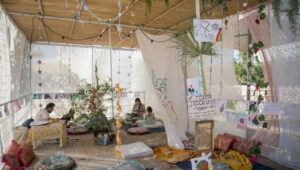No matter what country or culture we live in, the desire to recreate a joyful early-life experience can indicate something very essential regarding destiny and calling for each of us.
When I was a child I had a grandmother (savta) who lived in the heart of Jerusalem, a Jerusalem very different from today’s modern city. My grandmother had 14 children most of whom were already married and had children of their own. These were my uncles and aunts and cousins.
My grandmother’s house was not big. It had 3 rooms: the room where she slept, my uncle Nissim’s room, and the “big room” – a room where she kept all sorts of things. She also had a large yard and a small shed.
Every year when the Day of Atonement ended, after sunset, and after we broke the fast with a meal, the whole family would get into my dad’s car and drive to Grandma’s to build a sukkah (temporary tabernacle or “booth”). You see, according to tradition, the sukkah is built at the end of the Day of Atonement (Yom Kippur). The men would take the sukkah out of the shed. It was made out of wooden poles and boards that needed to be re-assembled every year for the weeklong Feast of Tabernacles (during which Israel was commanded by God to sit in these booths to remember His provision after the Exodus, in the desert).
The walls of the sukkah were made of thin wooden panels. It had a window, a curtain and a door. And while the menfolk were beating with hammers and nails and reconnecting all the wood, all the children would go into the “big room” and pull out from under the couch a suitcase with marvelous sukkah ornaments. We were so excited! And as we took out more and more stuff, we sorted out what was good and usable, and what should already be discarded.
Within a few hours a sukkah was standing. The mothers hung white sheets on the wooden walls and a white curtain on the small window, and then it was our turn – the children’s turn – to hang the decorations. From that evening until Sukkot (about 4 days) we would come every day to Grandma with additional decorations and paper chains we made at home, or bought at the store – until there was no more room for any more, and the Sukkah was adorned like a queen.
On the eve of the holiday we would all gather at Grandma’s house; each family would come with its own food. To this day, I cannot fathom how we managed to cram the whole tribe into a sukkah that was about 4 meters by 4 meters in size (12 x 12 feet).

How did we do it?
This was my grandmother’s special secret, which I later realized was her essential calling in the world. As far as my grandmother was concerned, it was obvious that everyone was coming. There was no other option for her at all. And my grandmother, who was like a queen, simply commanded her children to come. And everyone would come – about 40 people – and sit inside the sukkah. For my grandmother, who was an orthodox religious woman, we were the honored guests (Ushpizin) of the sukkah. For her, we were the main decorations of the evening.
Our “togetherness” was the center and essence of the whole holiday. To this day
I can still hear the clinking of moving chairs, the giggles of cousins crawling under tables to take a seat, the holiday melodies, and the reassuring tones of the men reciting sukkot blessings.
I can hear the rattling of plates and the dishing out of food from the pots.
I can see the sink overflowing with dishes.
I can hear someone ask, “Who wants to do the dishes?”
I can see the women all standing in the kitchen and working together.
We children grew up year by year in this immersive family atmosphere, gradually taking on a more mature status in the “tribe.” After we had all grown up and my grandmother had already passed away, we could no longer recreate that same togetherness with all the cousins. But by now, each family has grown and developed on its own, becoming a new nucleus that sustains this tradition.
The essence of the holiday is being together, opening the heart and opening the home. It is the holiday joy, the preparations, the celebration and inviting as many guests as possible. These have become an integral part of my life together with my husband. And by the way, amazingly, my husband managed to celebrate the holiday in Grandma’s sukkah before she passed.
The longing for Grandma Miriam is non-stop, but I can wholeheartedly say that her legacy remains. And that legacy is not just to celebrate the holidays and fulfill the mitzvah (biblical command). That legacy is to show us that our hearts can open up in generosity, wider and wider. Her legacy is that there was no need to close people out. There is room for all. As the heart grows, love grows with it. And the joy of the holiday becomes a tangible essence.
Because the most important mitzvah on Sukkot is: “And you shall be joyful in your feast and surely rejoice.”
“Consider it all joy!”

Deuteronomy 16:13-15
13 “You shall observe the Feast of Tabernacles seven days, when you have gathered from your threshing floor and from your winepress. 14 And you shall rejoice in your feast, you and your son and your daughter, your male servant and your female servant and the Levite, the stranger and the fatherless and the widow, who are within your gates. 15 Seven days you shall keep a sacred feast to the Lord your God in the place which the Lord chooses, because the Lord your God will bless you in all your produce and in all the work of your hands, so that you surely rejoice.
Leviticus 23: 40-43
“…and you shall rejoice before the Lord your God for seven days. 41 You shall keep it as a feast to the Lord for seven days in the year. It shall be a statute forever in your generations. You shall celebrate it in the seventh month. 42 You shall dwell in tabernacles (booths) for seven days. All who are native Israelites shall dwell in booths, 43 that your generations may know that I made the children of Israel dwell in booths when I brought them out of the land of Egypt: I am the Lord your God.”















